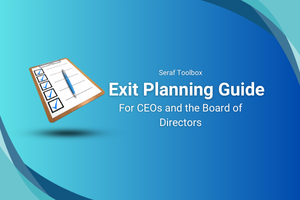Note: This article is part of a series on Exits and a series on Board Directors. To learn more, download our companion eBooks Angel Exits: Perspective and Techniques for Maximizing Investment Returns and Director's Guidebook: How to be an Effective Board Director in Early Stage Companies, or purchase our books at Amazon.com.

As a director on an early stage company board, how do you deliver on your main responsibility as a board member - maximizing shareholder value? And, what do you do to make sure the CEO is doing her job in increasing the value of your investment in the company? And what good is the increase in value if it is not accompanied by sufficient liquidity to realize it? Those are very important questions that very few early stage company boards take the time and effort to ask early on when it is still possible to have the biggest impact.
The startup company IPO is a much rarer creature than it used to be, so most early stage companies return maximum value to their shareholders through some form of acquisition. Planning for such an exit is an ongoing responsibility for both the CEO and the board. With that challenge in mind, we put together a guide to help with this planning exercise. CEOs should use this guide as an approach or checklist to help stay on top of who their potential acquirers are and what the company’s relationship is with each acquirer. And, furthermore, CEOs should use this guide as a way to update the board on at least an annual basis.
Download the Exit Planning Guide >>
What topics are covered in the exit planning guide for early stage companies?
For each potential acquiring company, the guide asks the following questions:
-
Status: This really goes to awareness. What is the status of any discussions? What do they know about our company? Who are the key people we met with? Describe the key relationships we have within this acquirer? Do we need to develop additional relationships?
-
Need: Why would the acquirer want to buy our company? Are we a "must have" or a "nice to have"?
-
Value: What do they value us for and what kind of valuation rubric might they use? Are they buying us for our people, our technology, our product or our business? What might our company be worth to the acquirer? How will they determine the value - as a multiple of revenue or EBITDA; using a buy vs. build vs. partner analysis, or for some strategic reason like keeping us out of the hands of a competitor?
-
Milestones: What milestones will we need to achieve before the acquirer will be interested?
-
Current Opportunities: What opportunities do we have to work with the acquirer before an acquisition is made? What actions are we taking on these opportunities?
-
Appetite for Acquisition: What acquisitions has this company made in the past few years? What price have they paid for these acquisitions?
By answering these questions with some level of detail, you will get a much better sense for what your company needs to accomplish before it’s well positioned for an acquisition. Since putting all your eggs in one basket is not a great strategy, you will want to have a list of at least 5 acquiring companies and preferably more in the range of 10 to 15.
What are some of the questions a potential acquirer will ask an early stage company?
Once you reach the point where there is serious interest in acquiring your company, you will need to be prepared to answer some challenging questions. Some of these questions are specific to your company’s growth plans, and we expect the CEO and board have been focused on answering these questions for quite some time.
-
What are the key metrics you track to understand how your business is growing? How have those metrics been trending over the past year?
-
What do you believe is the total addressable market for your business?
-
Where do you see the greatest opportunities for growth in your business? What are you doing today to go after those opportunities?
-
What companies do you see as your biggest competitors and what do you think differentiates your products from their products?
-
How close to your annual plan have you been over the past 8 quarters? How confident are you in your projects for the upcoming 4 quarters?
Other questions will be specific to your willingness to be acquired. The buyer will want to understand your motivations and fit with their company. So be prepared with great answers to the following questions:
-
What are your reasons for selling the company?
-
What do you see as the most important synergies between our company and yours?
-
After we complete the acquisition, what role will the CEO and her management team play in our company?
These two sets of questions are by no means complete. But, they are a starting point that will help you think about what questions are important for a potential buyer of your company. Start with these questions, add some of your own, and make sure the CEO can answer them all in a credible fashion.
Download the Exit Planning Guide >>
For a more in-depth discussion on early stage company board issues and exits, download our companion eBooks: Director’s Guidebook: How to be an Effective Board Director in Early Stage Companies and Angel Exits: Perspective and Techniques for Maximizing Investmenty Returns, or purchase our books at Amazon.com.
To access additional resources and download more templates, view our entire Director’s Guidebook Series and Startup Board Dynamics Series.

